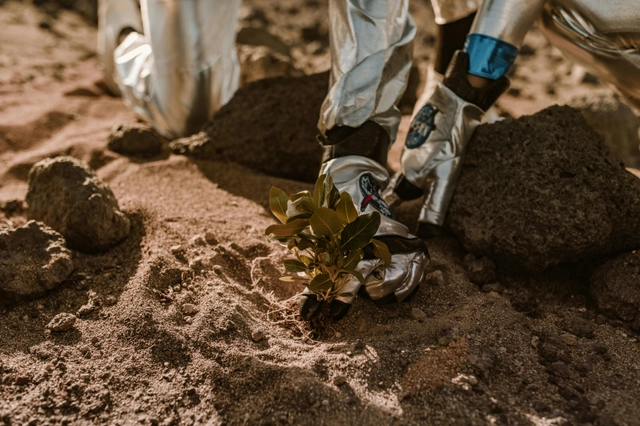1. What is Astrobiology?
Astrobiology is the study of the origin, evolution, distribution, and future of life in the universe. This field combines elements of biology, chemistry, and planetary science to explore life's potential beyond Earth.
- Interdisciplinary Nature: Astrobiology integrates knowledge from various fields such as biology, astronomy, geology, and atmospheric science to understand life in different environments.
- Goals of Astrobiology: The primary goals include identifying the conditions that support life, understanding the potential for life elsewhere, and exploring the possibilities of human life beyond Earth.
2. The Search for Extraterrestrial Life
Scientists search for signs of life beyond Earth through various methods, including studying extreme environments, analyzing planetary atmospheres, and exploring other celestial bodies.
- Astrobiological Signatures: Scientists look for biosignatures, which are indicators of life, in the atmospheres of distant planets. Gases like oxygen and methane can suggest biological processes.
- Extreme Life on Earth: Studying extremophiles—organisms that thrive in extreme conditions—helps astrobiologists understand the potential for life in harsh environments elsewhere.
3. Planetary Habitability
This area examines the factors that make a planet capable of supporting life. Key elements include distance from the sun, atmospheric conditions, and presence of water.
- The Role of Water: Water is considered essential for life as we know it. The presence of liquid water on a planet's surface increases its potential to host life.
- The Importance of Atmosphere: A stable atmosphere can protect potential life from harmful cosmic radiation and helps maintain suitable temperatures.
4. Astrobiology Missions and Research
Several missions have been launched to explore other planets and moons in search of signs of life. Key missions include Mars rovers and the study of icy moons like Europa.
- Mars Rovers: Rovers like Curiosity and Perseverance are equipped with tools to analyze soil and rock samples, looking for organic compounds and signs of past life.
- Ocean Worlds: Moons such as Europa and Enceladus are believed to have subsurface oceans, making them prime targets for astrobiological research.
5. Astrobiological Models
Scientists develop models to simulate conditions on other planets and predict how life might evolve under different scenarios.
- Evolution in Alien Environments: Models help researchers understand how life might adapt to different atmospheres, temperatures, and chemical compositions.
- Simulation of Exoplanet Conditions: Creating simulations of exoplanets allows scientists to predict potential habitability and the likelihood of life forms developing.
6. The Role of Microbial Life
Microbial life is the foundation of all known life forms and plays a crucial role in ecosystems. Understanding microbes helps astrobiologists learn about life's resilience and adaptability.
- Extremophiles: Extremophiles are organisms that can survive in extreme conditions, such as high radiation, temperature, and pressure. Studying these organisms provides insight into how life could exist on other planets.
- Microbial Metabolism: Understanding how microbes obtain energy and nutrients is key to identifying potential biosignatures on other planets.
7. Ethical Considerations in Astrobiology
As the search for extraterrestrial life progresses, ethical questions arise about planetary protection, contamination, and the implications of discovering life.
- Contamination Risks: Preventing contamination of other planets with Earth organisms is crucial to ensure the integrity of astrobiological research and the preservation of potential alien ecosystems.
- Implications of Discovery: Finding extraterrestrial life could profoundly impact philosophy, religion, and humanity's understanding of its place in the universe.
8. Future of Astrobiology
The future of astrobiology is promising, with advancements in technology enabling more detailed exploration of celestial bodies and the potential for new discoveries.
- Advanced Telescopes: New telescope technologies will allow astronomers to analyze the atmospheres of distant exoplanets, searching for potential signs of life.
- Robotic Exploration: Future missions will utilize advanced robotics to explore extreme environments on Mars, Europa, and beyond.
9. Astrobiology and Public Engagement
Engaging the public in discussions about astrobiology fosters interest and support for research. Educational programs and outreach efforts play a key role.
- Public Awareness: Public interest in astrobiology is growing, influenced by popular media, documentaries, and scientific breakthroughs.
- Citizen Science Projects: Initiatives that involve the public in research, such as searching for exoplanets, can enhance understanding and engagement in science.
10. The Role of International Collaboration
Astrobiology research often involves collaboration across countries and institutions, pooling resources and expertise to tackle complex questions.
- Collaborative Missions: Joint missions between countries, like the Mars 2020 rover, showcase the benefits of international partnerships in space exploration.
- Shared Research Initiatives: Collaborative research programs enable scientists to share data, methodologies, and findings, advancing the field as a whole.
Summary
- Astrobiology is the study of life beyond Earth, combining biology, chemistry, and planetary science.
- Scientists search for extraterrestrial life through missions and the study of extreme environments.
- Key factors for planetary habitability include the presence of water, suitable atmospheres, and temperature ranges.
- Astrobiological research involves understanding microbial life and developing models for potential life on other planets.
- Ethical considerations in astrobiology address contamination risks and the implications of discovering extraterrestrial life.
References
- - Astrobiology: A Very Short Introduction (Book by David C. Catling)
- - NASA Astrobiology Institute (NASA)
- - SETI Institute (Search for Extraterrestrial Intelligence)
- - Exoplanet Exploration (NASA)
- - The Goldilocks Zone (NASA)
- - Planetary Habitability (Astrobiology Magazine)
- - Mars Exploration Program (NASA)
- - Europa Clipper Mission (NASA)
- - Astrobiological Modeling (Astrobiology Magazine)
- - Biological Evolution Models (Nature)
- - Microbial Life in Extreme Environments (Nature Reviews Microbiology)
- - Microbes and the Search for Life (Astrobiology Magazine)
- - The Ethics of Astrobiology (NASA)
- - Planetary Protection Policy (NASA)
- - Upcoming Astrobiology Missions (NASA)
- - The Role of AI in Astrobiology (Science Advances)
- - Astrobiology in Education (NASA)
- - Science Communication (Scientific American)
- - Global Collaborations in Space Science (European Space Agency)
- - Astrobiology Research Centers Worldwide (Astrobiology Magazine)
keywords: astrobiology; extraterrestrial life; planetary science; habitability.
Partner Suggestion
Fun Science Experiments for Kids

